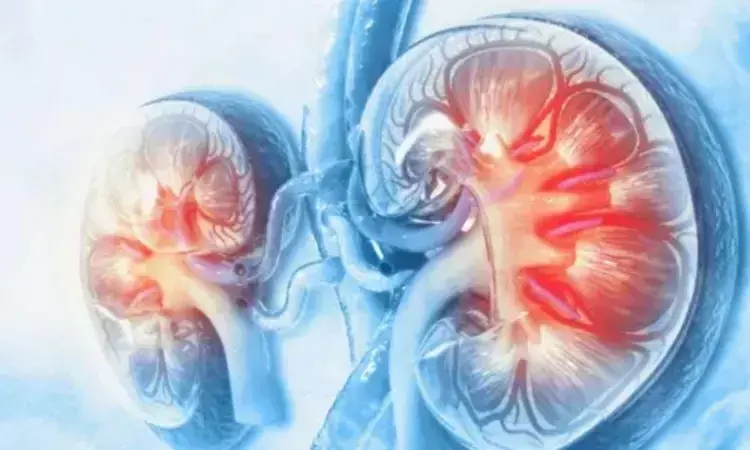- Home
- Medical news & Guidelines
- Anesthesiology
- Cardiology and CTVS
- Critical Care
- Dentistry
- Dermatology
- Diabetes and Endocrinology
- ENT
- Gastroenterology
- Medicine
- Nephrology
- Neurology
- Obstretics-Gynaecology
- Oncology
- Ophthalmology
- Orthopaedics
- Pediatrics-Neonatology
- Psychiatry
- Pulmonology
- Radiology
- Surgery
- Urology
- Laboratory Medicine
- Diet
- Nursing
- Paramedical
- Physiotherapy
- Health news
- Fact Check
- Bone Health Fact Check
- Brain Health Fact Check
- Cancer Related Fact Check
- Child Care Fact Check
- Dental and oral health fact check
- Diabetes and metabolic health fact check
- Diet and Nutrition Fact Check
- Eye and ENT Care Fact Check
- Fitness fact check
- Gut health fact check
- Heart health fact check
- Kidney health fact check
- Medical education fact check
- Men's health fact check
- Respiratory fact check
- Skin and hair care fact check
- Vaccine and Immunization fact check
- Women's health fact check
- AYUSH
- State News
- Andaman and Nicobar Islands
- Andhra Pradesh
- Arunachal Pradesh
- Assam
- Bihar
- Chandigarh
- Chattisgarh
- Dadra and Nagar Haveli
- Daman and Diu
- Delhi
- Goa
- Gujarat
- Haryana
- Himachal Pradesh
- Jammu & Kashmir
- Jharkhand
- Karnataka
- Kerala
- Ladakh
- Lakshadweep
- Madhya Pradesh
- Maharashtra
- Manipur
- Meghalaya
- Mizoram
- Nagaland
- Odisha
- Puducherry
- Punjab
- Rajasthan
- Sikkim
- Tamil Nadu
- Telangana
- Tripura
- Uttar Pradesh
- Uttrakhand
- West Bengal
- Medical Education
- Industry
Proenkephalin as biomarker for acute renal injury - a systematic review

Recently published systematic review and meta-analysis aimed to investigate the correlation between Proenkephalin A 119-159 (PENK) levels and the development of acute kidney injury (AKI). The review incorporated 11 observational studies with 3969 patients, and the overall sensitivity and specificity of PENK in identifying AKI were found to be 0.69 and 0.76, respectively. The combined positive likelihood ratio (LR) stood at 2.83, and the negative LR was 0.41. The study also determined the optimal cutoff value of PENK for early detection of AKI to be 57.3 pmol/L, and the SROC curve showcased a pooled diagnostic accuracy of 0.77. Patients with a history of hypertension or heart failure demonstrated a lower specificity of PENK in correlating the development of AKI. Further analyses suggested that patients with heart failure and hypertension may result in a higher false-positive rate when using PENK as an early indicator of AKI.
Conclusion on PENK's Potential as a Biomarker for AKI
The study concluded that PENK possesses significant potential as a biomarker for the early detection of the development of AKI, using a cutoff point of 57.3 pmol/L for PENK. The article also highlighted the need for additional clinical trials and real-world studies to validate the utility of PENK as a biomarker for anticipating AKI onset. The findings from the systematic review and meta-analysis support the potential of PENK as a biomarker for incident AKI with high positive and negative likelihood ratios. Additionally, a distinct cutoff value for PENK was established, enhancing its utility in excluding the possibility of AKI.
Evaluation of Study Quality and Acknowledgement of Limitations
The study's conclusions are strengthened by a comprehensive evaluation of study quality by using the QUADAS-2 framework, as well as trial sequential analysis (TSA), which demonstrated that the required information size was exceeded, further supporting the notion that PENK is an effective biomarker for ruling out the presence of AKI based on negative levels of PENK. However, the study acknowledged several limitations, including moderate sample sizes across most studies, limited number of studies for extensive subgroup analysis, variations in PENK analysis methods, and potential influence of heart failure and hypertension on PENK's diagnostic accuracy.
Summary of Systematic Review and Meta-Analysis Findings
In summary, the systematic review and meta-analysis provide robust evidence of PENK's diagnostic accuracy for AKI and suggest its potential as a reliable biomarker for early detection, with the understanding that further research and validation in different clinical settings and patient subgroups are essential to enhance its diagnostic performance and impact on patient outcomes.
Reference –
Lin, LC., Chuan, MH., Liu, JH. et al. Proenkephalin as a biomarker correlates with acute kidney injury: a systematic review with meta-analysis and trial sequential analysis. Crit Care 27, 481 (2023). https://doi.org/10.1186/s13054-023-04747-5.
MBBS, MD (Anaesthesiology), FNB (Cardiac Anaesthesiology)
Dr Monish Raut is a practicing Cardiac Anesthesiologist. He completed his MBBS at Government Medical College, Nagpur, and pursued his MD in Anesthesiology at BJ Medical College, Pune. Further specializing in Cardiac Anesthesiology, Dr Raut earned his FNB in Cardiac Anesthesiology from Sir Ganga Ram Hospital, Delhi.
Dr Kamal Kant Kohli-MBBS, DTCD- a chest specialist with more than 30 years of practice and a flair for writing clinical articles, Dr Kamal Kant Kohli joined Medical Dialogues as a Chief Editor of Medical News. Besides writing articles, as an editor, he proofreads and verifies all the medical content published on Medical Dialogues including those coming from journals, studies,medical conferences,guidelines etc. Email: drkohli@medicaldialogues.in. Contact no. 011-43720751


